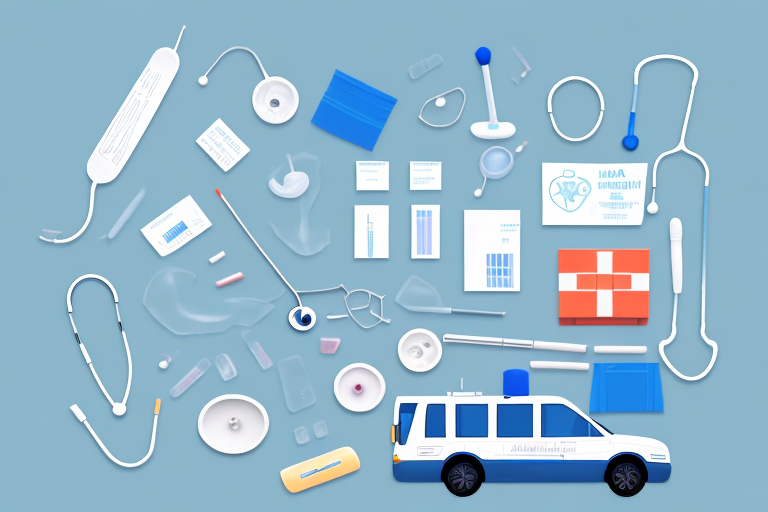Starting a Medical Supply Delivery Business: What You Need to Know
If you are considering starting a medical supply delivery business, there are several important factors to consider. From understanding the industry and conducting market research to obtaining licenses, building a strong brand, and managing logistics, this guide covers all the crucial aspects of launching and running a successful medical supply delivery business.
Industry Overview and Market Analysis
Understanding the Medical Supply Industry
The medical supply industry is a rapidly growing and complex sector, projected to reach over $500 billion by 2027 according to IBISWorld. It encompasses various segments, including durable medical equipment (DME), surgical supplies, pharmaceuticals, and laboratory equipment. Each segment has its unique market dynamics and regulatory requirements.
One crucial aspect to consider is the regulatory environment. The industry is heavily regulated by government agencies such as the Food and Drug Administration (FDA) and the Centers for Medicare & Medicaid Services (CMS). Staying up-to-date with the latest regulations and compliance requirements is essential for legal and ethical operations.
Conducting Market Research
Market research is vital to understand competition, target demographics, and regional trends. Tools like Statista and reports from industry analysts can provide valuable insights. Identifying gaps in the market and potential areas for growth can help you develop a unique value proposition.
Identifying Your Target Audience
Your target audience may include hospitals, clinics, pharmacies, nursing homes, and individual patients requiring home medical supplies. Tailoring your marketing and sales strategies to meet the specific needs and preferences of these groups can enhance customer satisfaction and loyalty.
Business Planning and Strategy
Creating a Comprehensive Business Plan
A solid business plan outlines your products and services, legal structure, financial projections, and marketing strategies. Resources like the U.S. Small Business Administration (SBA) offer templates and guidance for developing an effective business plan.
Marketing Strategies
Effective marketing strategies can include online marketing, attending industry trade shows, leveraging patient referrals, and establishing a strong online presence through a professional website and social media platforms. Utilizing SEO best practices can increase your visibility to potential customers searching for medical supply delivery services.
Managing Finances and Budgeting
Proper financial management ensures sustainability and growth. This includes creating a realistic budget, tracking revenue and expenses, and optimizing cash flow. Planning for growth involves investing in new technologies, expanding services, and exploring new markets.
Legal and Regulatory Compliance
Registering Your Business
Before operating, register your business with the appropriate authorities. Requirements may vary by location but generally include obtaining a business license, a tax ID number, and liability insurance. The SBA provides detailed information on necessary licenses and permits.
Understanding Legal Requirements
Compliance with laws such as HIPAA is mandatory to protect patient information. Additionally, ensuring that medical devices and pharmaceuticals meet FDA approval standards is crucial. Non-compliance can result in significant fines and damage to your business reputation.
Operations and Logistics
Choosing the Right Suppliers
Selecting reliable suppliers who adhere to regulatory standards ensures the quality and safety of your medical supplies. Evaluate suppliers based on product quality, pricing, delivery reliability, and customer support. Establishing strong relationships with suppliers can lead to better terms and collaboration opportunities.
Setting Up Delivery Networks
An efficient logistics system is the backbone of a delivery business. Utilize advanced software for inventory management, order tracking, and route optimization. Partnering with reliable transportation providers and ensuring your fleet meets safety standards are essential for timely and secure deliveries.
Hiring and Training Staff
Employing experienced and skilled staff is critical for operational efficiency. Provide comprehensive training on the latest technologies, best practices, and regulatory compliance. Fostering a positive company culture can enhance teamwork and employee retention.
Branding and Customer Relations
Building a Strong Brand Identity
A memorable brand includes a unique name, professional logo, and a user-friendly website. Consistent branding across all channels builds trust and recognition. Exceptional customer service, responsiveness to feedback, and continuous improvement of products and services contribute to a strong brand reputation.
Maintaining Relationships
Strong relationships with customers and suppliers are vital for long-term success. Provide reliable service, address customer inquiries promptly, and negotiate favorable terms with suppliers. Building trust through consistent performance fosters loyalty and repeat business.
Growth and Innovation
Staying Up-to-Date with Industry Trends
The medical supply industry is constantly evolving with new technologies and regulations. Attending industry conferences, networking with professionals, and subscribing to industry publications can keep you informed about the latest developments.
Embracing Innovations
Adopting new technologies such as automated inventory systems, AI-driven analytics, and telemedicine integrations can enhance your service offerings and operational efficiency. Being open to innovation can provide a competitive edge in a dynamic market.
Starting a medical supply delivery business requires careful planning, adherence to regulations, and a commitment to quality and customer satisfaction. By following these guidelines and staying informed about industry developments, you can build a successful and sustainable business that meets the needs of your customers and contributes positively to the healthcare sector.



















